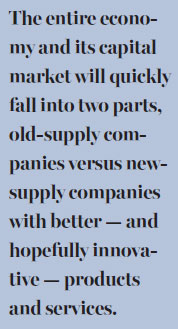Old phrase points to new thinking
Updated: 2016-01-08 07:54
By Ed Zhang(China Daily Europe)
|
|||||||||||
Mention of 'political economy' in key statement shows China's supply-side reform is more than just a policy
Predicting China's performance in 2016 has become easy.
I say this because of one line in the statement from the top decision-makers' annual Central Economic Work Conference in late December. Of course, you always have to read between the lines when you want to decipher what an official statement actually means when it is written in the style of a college textbook.
For a long time, perhaps since reforms began in 1978, no official statement - at least as I can recall - has ever used the phrase "political economy" to represent a short-term policy (or policy package). But it is in the Central Economic Work Conference statement. It is specifically related to what leaders call supply-side reform.
The term political economy, as economic students will know, usually carries a classical connotation. Political economy, or political economics, is what early economics was like, when government and the economy tended to be discussed in the same breath, Marx being an example.

For some time, in Chinese colleges, only Marx's economic theory was called political economy. The theories of later economists were usually lumped together as technical economics, even though they have contributed great ideas to people's understanding of what a government can do about the economy.
That the term political economy can resurface in a Chinese policy paper post-reform era certainly doesn't indicate it will compete with Marx for scholastic accomplishment. But it is an indication of China's confidence in its knowledge about managing government and the economy simultaneously. And it is an indication that the Central Economic Work Conference's central idea, namely supply-side reform, is more important than an ordinary policy.
It may suggest that it is a theoretic framework, not just one policy or one strategy. And it marks a turning point that, from now on, all things will be done in this framework and will follow this general line.
But why give it so much importance? One only has to put it in the perspective of recent history.
We are not far from the global financial crisis of 2008. Eight years (well, eight years in October 2016) is not a short period. World War I lasted half as long. And for the Chinese people, the brutalities of World War II lasted no more than eight years.
But in the past eight years, what has the world learned? Little, perhaps, as one would say in the theory of economics, except for more skillful and more daring uses of Keynesianism.

Most people know what Keynesianism means in the Chinese context. The famous (or notorious, depending on how you look at it) 4 trillion yuan ($586 billion; 420 billion euros at 2009 exchange rate) government bailout program in 2009 is a classic example. For all the good things it did for the economy, especially for state-owned enterprises, it encouraged the same industries to operate under the same management, turning out the same products for the same customers, and perhaps using the same materials and discharging the same level of pollution.
All stimulus attempts in the following years, large and small, direct and indirect, followed the same line - on a basic assumption that demand will remain largely unchanged, always waiting for the same supply.
But that assumption is far from the reality. The old demand is stagnant, if not withering, while the new demand is unanswered, and sometimes made more acute by the old supply.
One example of the last kind is the scantier supply of clean air in winter in northern China, and the dashed hope of a rising middle class for a better quality of life, caused by the continuation of the old supply, namely the excessive coal-powered industrial capacity, as well as continuation of the old demand, in particular the widespread use of cheap coal for household heating.
This is exactly where the idea of political economy fits in. It represents recognition of the reality that it would take too much time and cost too much if the government leaves the market to lead the supply to adapt to the demand in a large country, especially in a time of turbulent changes.
So what does this high-level recognition mean for the world's second-largest economy at the practical level? It doesn't take a fortune-teller to figure it out: There is no business as usual.
The entire economy and its capital market will quickly fall into two parts, old-supply companies versus new-supply companies with better - and hopefully innovative - products and services. This will turn a new page in Chinese development: All old supply will have to go, so long as there is a more efficient replacement.
The author is editor-at-large of China Daily. Contact the writer at edzhang@chinadaily.com.cn
(China Daily European Weekly 01/08/2016 page13)
Today's Top News
Man with knife shot dead outside Paris police station
Trading halted after shares fall 7% in opening minutes
China voices its 'resolute opposition' to DPRK test
Design exhibition to attract Chinese art works
Germans shaken by mass attacks on women
Concerns grow over Saudi-Iranian rising tensions
Obama tightens gun rules, requires background check
Refugee boy becomes first casualty in 2016
Hot Topics
Lunar probe , China growth forecasts, Emission rules get tougher, China seen through 'colored lens', International board,
Editor's Picks

|

|

|

|

|

|






